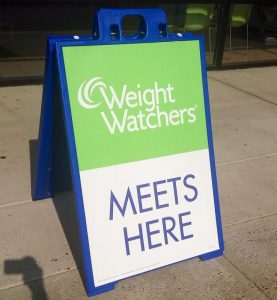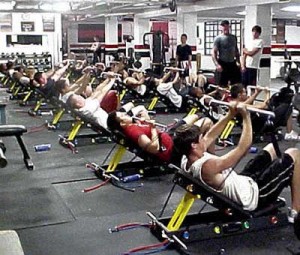
Image by Mike Mozart/Flickr
Jenny Craig, Weight Watchers, Nutrisystem…you’ve seen the commercials and heard celebrities swear to their effectiveness for weight loss, but do they really work? If so, how well and, maybe the bigger question is why? The truth is that pretty much all of the commercial weight loss plans you’ve heard of from Atkins to the Zone and including the top three plans can be effective, but they can also be expensive and, at times, inconvenient. It’s true, weight loss isn’t necessarily about convenience but you will be more likely to stick with a plan that fits easily into your life so, logically, that would be the best weight loss plan for you. Since there is no question that these commercial plans can work, let’s look at how they work and why.
The How

Food from top commercial diet programs can be purchased online or at your local grocery store, making it as easy as possible to stick to their plan. Image by Mike Mozart/Flickr
Many times, the biggest obstacle to hitting your goals is lack of knowledge. No matter which commercial weight loss plan you go with, they’re all based on the same principal: teaching you how to eat. More specifically, they give you guidelines on daily caloric intake, and many get even more precise by addressing what types of food you can eat. For example, according to CBS News, meal replacement plans such as Optifast and Medifast restrict daily calories to 1,000 or less and require that you substitute one of their shakes or meal replacement bars for one or two of your meals each day.
The trend of most recent healthy weight loss advice is not skipping meals, though, and Web MD points out that eating regular meals along with controlling calories is the healthiest way to lose weight. That’s how the Big Three (Jenny, WW, and Nutrisystem) designed their individual plans, recommending that clients eat three meals a day plus one or two snacks. Additionally, all three offer prepared food, and the calories and nutrition have already been taken care of so you don’t have to do any weighing or calculations, though Jenny Craig and Nutrisystem rely heavily on the food they provide. Food can be purchased from Weight Watchers to take some of the guesswork out of dieting, but that plan focuses more on teaching you to make healthy choices on your own. The bottom line of how any of these plans work is that they walk you through eating every day and, if you are consistent and follow their advice closely, any of them will produce results.
The Why

Meetings and counseling are important parts of commercial diet plans that improve their effectiveness over dieting alone. Image by Mike Mozart/Flickr
For any of these weight loss plans, the “why” and the “how” are almost the same: you have someone else telling you how to eat. However, there’s a reason the most effective plans include support such as group meetings and counseling, and that’s because they increase those plans’ effectiveness. Both are a large part of why the top three plans are the top three, and they’re useful resources for information and guidance for people who need hand-holding. Not to disparage anyone who needs help sticking to a weight loss plan and managing a diet because that’s completely understandable in a world where more people eat out than at home and meals can be super-sized for a couple of bucks.
The meetings and counseling also keep you accountable. It’s easy to talk yourself into scarfing half a German chocolate cake when you’re feeling munchy at 11 o’clock at night if you don’t have to see your counselor or weigh in at a meeting the next day. The support and encouragement those resources provide are as important as the accountability factor. Knowing that those people understand you, have been or are where you’re at in the weight loss battle, and are rooting for you to succeed makes it a little easier to pass on the late-night cake-fest.
DIY

You have to get more active for any diet plan to work optimally, whether you take a fitness class, start jogging in the park, or find other ways to work exercise into your life.
You can always study up on healthy dieting and design your own. Maybe even talk to a doctor, dietician, or personal trainer for advice. Cost is the factor that U.S. News and World Report says discourages a lot of dieters from giving Jenny a go, so it makes financial sense to do it yourself. However, since most people try dieting at one point or another in their lifetimes, maybe an unsuccessful attempt is what has you considering commercial weight loss plans. If you have the money and want to try any of them, definitely do that. They’ll introduce you to a new way of eating, and shifting your mindset to eat differently than you have most of your life is really the first step. If you know you don’t want or can’t commit to paying for the plan long-term (if not for life), then set a limit, and quit the plan after you’ve spent a certain dollar amount, lost a certain number of pounds, or simply after a specific amount of time. But don’t quit using what you’ve learned.
Apply what you learn during that introductory period to the rest of your life. Eat healthier, smaller portions more frequently, and take advantage of any recipes the plan provides while you’re on it so you can build your own menus and meals once you’re on your own. Enlist a friend or family member for support. Even if they don’t want to do the diet with you, it will be valuable to have someone to talk to and to be accountable to.
Finally, like it or not, you have to get moving. In an assessment of Weight Watchers, U.S. News noted that the program added fitness to their plan to encourage clients to become more active. Though many other plans don’t prescribe exercise along with the diet they’ve built empires on, they still recommend it because it helps clients get the most out of the programs and see faster, more permanent results. Working out and exercise classes are obvious ways to get moving but there are a million little ways you can increase your calorie burn, and some of them can even be fun. The best part is that however you choose to work more activity into your days, whether it’s switching to a standing-height desk or going dancing once a week, it all counts toward calorie-burning physical activity that will help any diet plan work better. You can’t go wrong with that!
